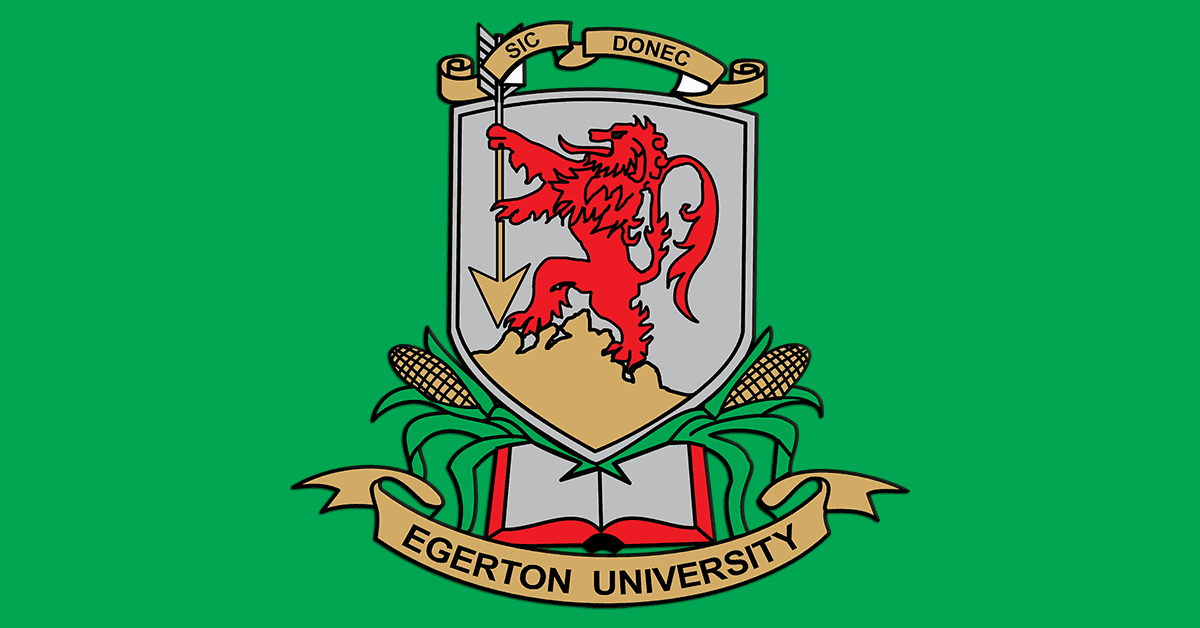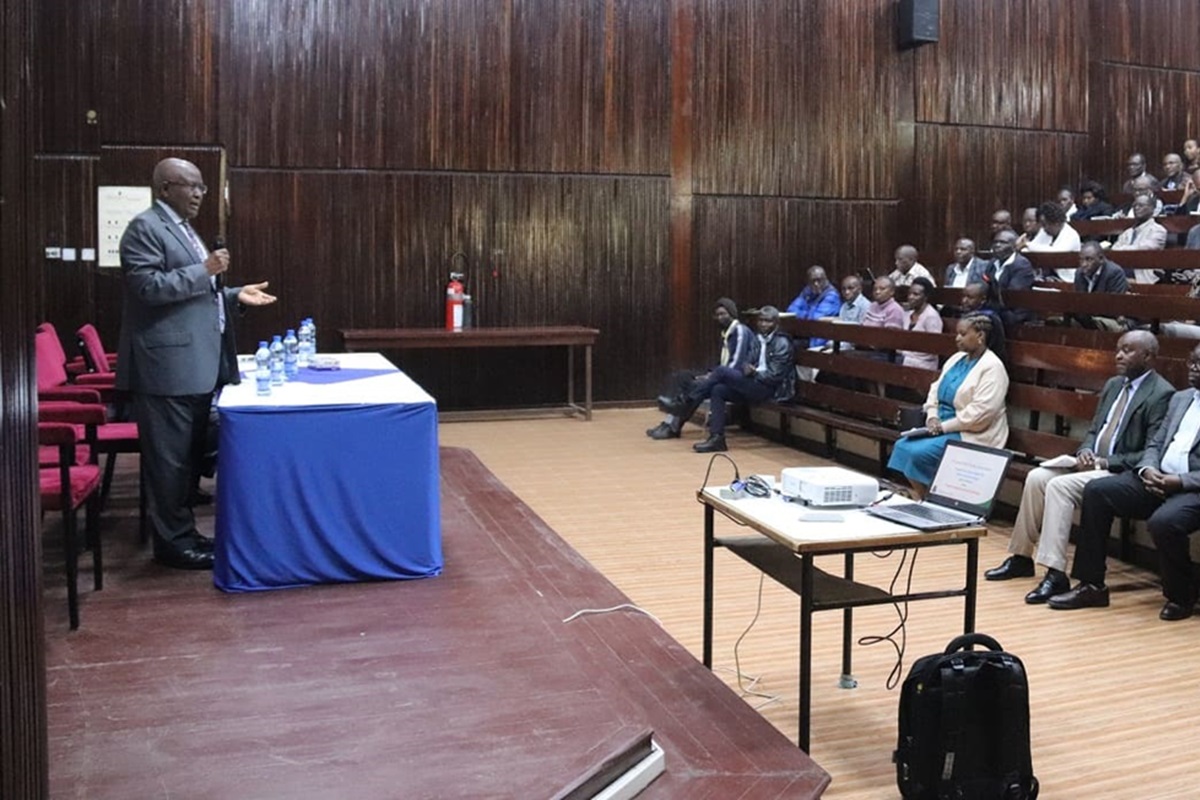Despite Covid-19, the LWM Programme Continues to Thrive
![]() Prof. Nzula KitakaThe Limnology and Wetlands Management Programme (LWM) is part of the Education and Research Hub for the Sustainable Management of Aquatic Ecosystems in East Africa (AQUAHUB) project. The main objective of the project is to enhance the facilities and capacity at Egerton University and other African partner institutions (Addis Ababa University and Bahir Dar University, both in Ethiopia) through training. The wider context of training in LWM is in line with Strategic Development Goal (SDG) 6 and SDG 3 on clean water and enviroment and good health, positioning LWM as a regional flagship programme in Eastern Africa coupled with the establishment of South-South and North-South collaboration and networks.
Prof. Nzula KitakaThe Limnology and Wetlands Management Programme (LWM) is part of the Education and Research Hub for the Sustainable Management of Aquatic Ecosystems in East Africa (AQUAHUB) project. The main objective of the project is to enhance the facilities and capacity at Egerton University and other African partner institutions (Addis Ababa University and Bahir Dar University, both in Ethiopia) through training. The wider context of training in LWM is in line with Strategic Development Goal (SDG) 6 and SDG 3 on clean water and enviroment and good health, positioning LWM as a regional flagship programme in Eastern Africa coupled with the establishment of South-South and North-South collaboration and networks.
In the long term LWM targets the intervention logic of Theory of Change (TOC) with the alumni influencing sustainable management of aquatic ecosystems and their resources in Eastern Africa coupled with improved livelihood.
The Master's in Limnology and Wetlands Management (LWM) degree is jointly offered by Egerton University, Kenya, The University of Natural Resources and Life Sciences, BOKU, Austria and IHE-Delft, The Netherlands.
Since its inception in 2012, the programme has trained 80 young water professionals on the wise and sustainable use of aquatic resources within the region and beyond with a 100% completion rate.
The programme involves a rotational system whereby students begin their first trimester in October in BOKU, Austria, and then move to Egerton University in February for the second trimester, which runs for four months. This is followed by the third and the last trimester in IHE, Delft, which starts in June. The final phase of the project involves the writing of a Master’s thesis.
The students are expected to develop a Master's research proposal, to undertake the research, and to present a thesis for examination in one of the partner institutions. Given the learners must complete their studies and graduate within 18 months, during which they enjoy a scholarship supported mainly by the Austrian Development Cooperation (ADC), the Orange Knowedge Programmer (OKP), and, in special circumstances, the Erasmus Mundus Fellowship Programme (EMFP).
LWM was not spared by the 2020 Covid-19 pandemic, which rocked the world at large. The first Covid-19 wave in Kenya began to affect the programme as the 2019/2021 cohort were undertaking their second trimester in Kenya.
Although the pandemic came with several challenges, Including restrictions on movement, LWM shifted swiftly to online learning. Consequently, five students out of eight conducted their research and thesis phase at Egerton University and are graduating today. They are Mr Ali Makame, Ms Lorine Omondi, and Ms Dorcas Mutei from Kenya; and Ms Mary Florence Nantonngo and Ms Harriet Okomo from Uganda.
 Students enrolled into the LWM programme collect samples for their research during field work at River Njoro in March 2021The Covid-19 pandemic has transformed LWM into a more adaptive programme, which has continued to offer quality training despite the challenges presented by the pandemic, with lectures given by professionals from Egerton University, Kenya; The University of Dar es Salaam, Tanzania; Makerere University, Uganda ; University of Addis Ababa, Ethiopia; and government institutions such as the Marine and Fisheries Institute.
Students enrolled into the LWM programme collect samples for their research during field work at River Njoro in March 2021The Covid-19 pandemic has transformed LWM into a more adaptive programme, which has continued to offer quality training despite the challenges presented by the pandemic, with lectures given by professionals from Egerton University, Kenya; The University of Dar es Salaam, Tanzania; Makerere University, Uganda ; University of Addis Ababa, Ethiopia; and government institutions such as the Marine and Fisheries Institute.
The wide experience of the resource persons has ensured that students have been acquiring the necessary skills and new knowledge using innovative ways of material delivery. This milestone achievement of the 2020/2021 group of students has demonstrated the resilient nature of the programme and of its participants, motivating us to advertise for the 2020/2022 intake despite the Covid- 19 pandemic.
Currently the programme has nine students from Ethiopia, Kenya, and Uganda under blended learning (both fieldwork and lectures) under strict adaptive prevention measures to Covid-19.
The students have completed the Kenyan trimester and are on transit to IHE, Delft for the third trimester. The lesson leant is that Covid-19 is a game- changer and requires an adaptive management approach to overcome the challenges that come with it.
Lastly, I wish to encourage the young water scientists from the region who seek to quench their academic thirst to apply for this great opportunity and become part of the 2021/2023 cohort. They should visit the they need:https://boku.ac.at/en/wau/ihg/master-programme/international-joint-master-in-limnology-wetland-management.
The programme will endeavour to provide quality training.
Prof. Nzula Kitaka teaches in the Department of Biological Sciences and is the Coordinator of the LWM Programme at Egerton University.







